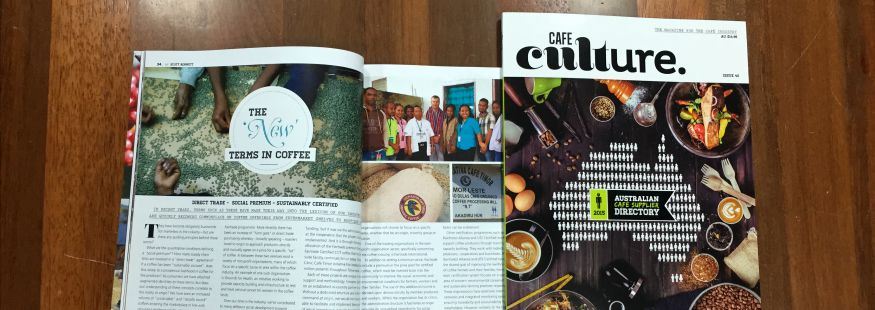The 'New' Terms in Coffee

'Sustainably certified', 'Social premium', 'Direct trade'. In recent years terms such as these have made their way into the lexicon of our industry and are quickly becoming commonplace on coffee offerings from supermarket shelves to boutique cafes.
They have become obligatory buzzwords for marketers in the industry - but are there any guiding principles defining these terms?
What are the quantitative conditions defining a “social premium”? How many supply chain links are involved in a “direct trade” agreement? If a coffee has been “sustainably sourced” does this relate to a prosperous livelihood in coffee for the producer? As consumers we have attached augmented identities to these terms, but does our understanding of these concepts correlate to the reality at origin? We have seen an increased volume of “sustainable” and “socially sound” coffees entering the marketplace in line with mounting evidence of the environmental and economic pressures of coffee farming. Awareness surrounding these pressures is the first step toward action; however with the diverse array of “sustainable” branded coffees on the market, where is best to allocate your extra dollars and cents?
Social investments in coffee can take on many different forms. Discourse surrounding the necessity and importance of social investment for producers at origin is well-versed within the industry; however, the best way to deliver these extra funds is widely debated. Traditionally, the most accessible and promoted way to support producers at origin has been to participate in the Fairtrade program. More recently there has been an increase of ‘farm gate’ or direct trade purchasing whereby - broadly speaking - roasters travel to origin to approach producers directly and mutually agree on a price for a specific "lot" of coffee. In between these two avenues exist a variety of non-profit organisations, many of which focus on a specific cause or area within the coffee industry. An example of one such organisation is Grounds for Health, an initiative working to provide capacity building and infrastructure to test and treat cervical cancer for women in the coffee lands.
Over our time in the industry, we’ve contributed to many different social development projects at origin. From 2005 to 2009 we supported a paediatric heart surgery initiative in India. In coordination with the Narayana Health Foundation and our export partners in southern India, each year at Christmas time we selected a child in need of a heart operation and fully funded the surgery costs. Through our export partner on the ground we were able to communicate with the foundation to ensure transparency and accountability.
In 2010, in collaboration with our Fairtrade certified producer partner Cooperativa Café Timor (CCT), we pledged additional funding to build a birthing suite facility in Lauana in rural Timor-Leste under CCT's Clinic Café Timor initiative. The project was realised through this additional funding, but it was via the administrative channels at the cooperative that the project could be implemented. And it is through the continued allocation of the Fairtrade premium from sales of Fairtrade Certified CCT coffee that the birthing suite facility continues to run today. To date the Clinic Café Timor initiative has treated over 2.1 million patients throughout Timor-Leste.
Each of these projects are unique in their support and methodology, however both relied on an established in-country partner to succeed. Without a dedicated structure and chain of command at origin we would not have been able to facilitate and implement these projects or, of equal importance, provide transparency and accountability to our customers.
Providing this integrated system on an on-going basis can be costly and labour intensive. The success of a non-profit organisation is dependent upon ongoing donor support. The recent suspension of programming by Coffee Kids, a popular Chicago based non-governmental organisation concerned with improving the livelihoods of coffee farmers and their families, is an example of the immense challenge required to run such an organisation. To ensure success, for both beneficiaries and stakeholders, it is imperative for these organisations to act with integrity and transparency. Given the scale of our industry it is not hard to understand why many non-profit organisations will choose focus on a specific area, whether that be an origin, minority group or cause.
One of the leading organisations in the non-profit organisation sector, specifically concerning the coffee industry, is Fairtrade International. In addition to setting a minimum price, Fairtrade include a premium in the price paid for certified coffee, which must be invested back into the community to improve the social, economic and environmental conditions for farmers, workers and their families. The use of this additional income is decided upon democratically by member producers and workers.Whilst the organisation has its critics, the administrative structure it facilitates at origin provides an unmatched opportunity for social development programs to be implemented and scrutinized. We have supported the Fairtrade program since its enactment in Australia, and over this time have contributed to various different projects in cooperatives all around the world. To date, the system has been one of the most accessible ways for roasters and consumers to give back to producers at origin.
One of the criticisms of the Fairtrade system is that it does not allow support to be offered to a specific producer. The cooperative based structure of the system allows for collaboration and capacity building amongst all producer members, however generally it does not offer the opportunity to work with an individual grower. For some roasters this factor can be a deterrent.
Other certification programs such as Rainforest Alliance and UTZ Certified work to support coffee producers through training and capacity building. They work with individual producers, cooperatives and businesses. Both Rainforest Alliance and UTZ Certified have the shared goal of improving the livelihoods of coffee farmers and their families, however each certification system focuses on a specific area of concern; environmental conservation and sustainable farming practices respectively. These organisations have extensive international networks and integrated monitoring systems, ensuring traceability and accountability for their stakeholders.
However, similarly to the Fairtrade system, the arduous compliance requirements and commercial nature of these organisations can act as a deterrent for some roasters.
The direct trade route has gained popularity in recent years, especially within the specialty coffee industry. A direct trade agreement may result in a higher profit for the producer for a specific "lot" of coffee, but the specialty coffee industry can be fickle. A roaster that visits one season, may not be knocking on the farm gate the next. Just as the large-scale certification programs are not always the right fit for some roasters, the direct trade route is not always applicable to every producer.
Social investments in coffee come in all shapes and sizes. Depending on the scale and timeline of the desired commitment, various processes are available to ensure your investment successfully reaches the producers on the ground. The most important aspects to consider when making a social investment are transparency and accountability. There also needs to be consideration as to the future of the investment. Once the initial project has been realised, how will it be maintained? It is imperative to remember that we are often dealing with underdeveloped countries with limited resources. Tried-and-tested community development initiatives that have proven successful in consuming countries are not always transferable to producing countries. Each project needs to be reviewed on a case-by-case basis. It is honourable to have the intent but, if the application is ineffective, we'll be forever stepping sideways.
First published in Cafe Culture Issue 40, September 2015.


